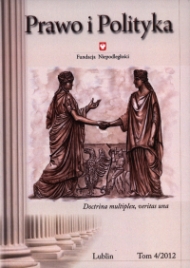Integracja przestrzeni prawnej Federacji Rosyjskiej
Russian Federation Legal Space Integration
Author(s): Anna Głąb Subject(s): Law, Constitution, Jurisprudence, Government/Political systems, Transformation Period (1990 - 2010)
Published by: Fundacja Niepodległości
Keywords: Russian Federation; federalism; regional law; integrity; legal system;
Summary/Abstract: The text concerns an integration of the legal space of the Russian Federation in time of presidency of Boris Yeltsin and Vladimir Putin. Back then, the nature of internal relations between centre and federal entities translated into the matter of the integrity of the legal space. Independence, proposed to entities in the early 1990s, was largely a result of the internal situation. The concept of “sovereignty” became very popular and was treated like an idea that will help to solve regional economic problems. Regional autonomy in determining the model of government and its competences, led to a number of instances of non-compliance with federal law. They concerned: national sovereignty, economic independence (ownership of natural resources), the right to secede and division of competences. With time, the growing sense of self-independence, emphasized in the constitutional provisions, became a threat to the territorial integrity of the Russian Federation. This trend reversed with Putin taking over the presidency and his policy of centralization of power and limiting the regional autonomy. Regional legislation, rarely successfully questioned in the 1990s, began to be subject of intense revision after 2000 (especially the legislation relating to the economic sphere, mainly budgetary issues, natural resources and taxes), and was complemented with changes of federal regulations. On the other hand, the revision of the federal law, made after 2000, also contradicted the federal constitution, significantly reducing the competences of the entities. The whole process has been long (though at the beginning the changes were carried out with high intensity) and cannot be considered as completed. For example, the Republic of Sakha deleted constitutional attribute of sovereignty only in June 2009, and the attribute is still present in the constitution of Tatarstan. Russia continues to look for an effective model for the federal relations, which results in frequent changes in legislation. The initially narrowed scope of competences of regional authorities, was significantly extended with time. The Governors’ eligibility abolished in 2005, was re-established in 2012. Now, the legal space is more consistent, although the example of the Republic of Tatarstan confirms the absence of its full integration.
Journal: Prawo i Polityka
- Issue Year: 2012
- Issue No: 4
- Page Range: 145-167
- Page Count: 23
- Language: Polish

